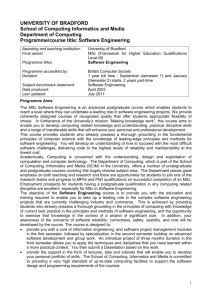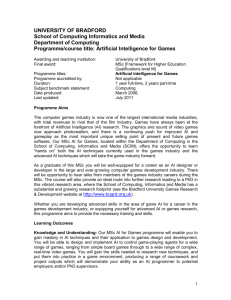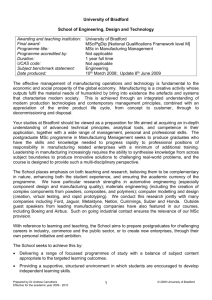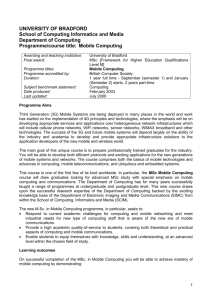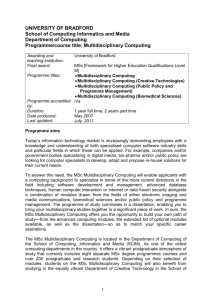MSc Multidisciplinary Computing
advertisement
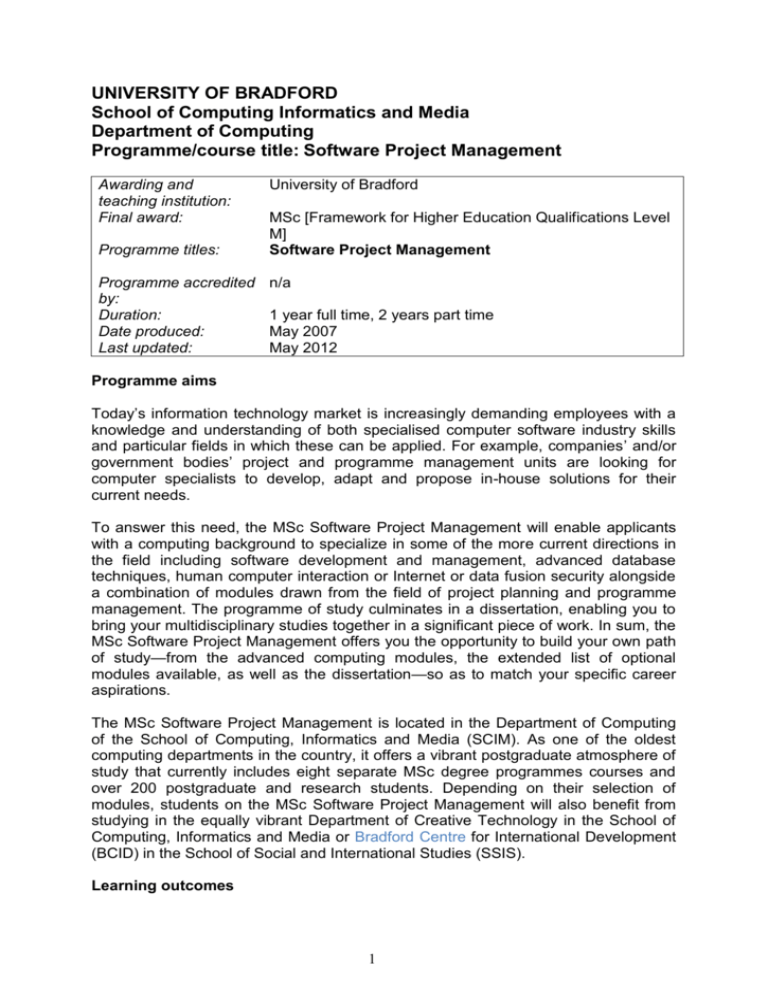
UNIVERSITY OF BRADFORD School of Computing Informatics and Media Department of Computing Programme/course title: Software Project Management Awarding and teaching institution: Final award: Programme titles: Programme accredited by: Duration: Date produced: Last updated: University of Bradford MSc [Framework for Higher Education Qualifications Level M] Software Project Management n/a 1 year full time, 2 years part time May 2007 May 2012 Programme aims Today’s information technology market is increasingly demanding employees with a knowledge and understanding of both specialised computer software industry skills and particular fields in which these can be applied. For example, companies’ and/or government bodies’ project and programme management units are looking for computer specialists to develop, adapt and propose in-house solutions for their current needs. To answer this need, the MSc Software Project Management will enable applicants with a computing background to specialize in some of the more current directions in the field including software development and management, advanced database techniques, human computer interaction or Internet or data fusion security alongside a combination of modules drawn from the field of project planning and programme management. The programme of study culminates in a dissertation, enabling you to bring your multidisciplinary studies together in a significant piece of work. In sum, the MSc Software Project Management offers you the opportunity to build your own path of study—from the advanced computing modules, the extended list of optional modules available, as well as the dissertation—so as to match your specific career aspirations. The MSc Software Project Management is located in the Department of Computing of the School of Computing, Informatics and Media (SCIM). As one of the oldest computing departments in the country, it offers a vibrant postgraduate atmosphere of study that currently includes eight separate MSc degree programmes courses and over 200 postgraduate and research students. Depending on their selection of modules, students on the MSc Software Project Management will also benefit from studying in the equally vibrant Department of Creative Technology in the School of Computing, Informatics and Media or Bradford Centre for International Development (BCID) in the School of Social and International Studies (SSIS). Learning outcomes 1 A career in software system development requires knowledge of the application, development, design and implementation of these systems, as well as a welldeveloped set of creative, problem-solving and teamwork skills. As such, students on the MSc Software Project Management will develop the following: Knowledge and Understanding. You will develop mastery of the practical and theoretical concepts of computer science, current and emerging trends in technology, and how these will be applied in the context of your chosen field of study. Discipline Specific Skills in the use of advance software development or project management for the design of specialized real-life systems, and the identification and evaluation of research methodologies in the chosen field of project management. Depending on the mix of core and optional modules selected, additional discipline specific skills in the field of project management studies will include systematic understanding of the project management process and its application to sustained economic development, whilst at the same time equipping you with the skills that are essential for analysis, design and development of software projects for programmes with defined outcomes. Personal and Transferable Skills, developed as a core thread throughout the proposed modules, requiring written and oral presentation, analysis, problemsolving, flexible specialisation, team-working and time management in a multidisciplinary environment. In addition, the need to balance and integrate the requirements of applied computing to different disciplines will enable students to develop initiative and flexibility to a broader range of approaches and environments. The Curriculum Typically for a taught Masters programme, the course lasts for 12 months of full-time study (two semesters of instruction through a series of modules all of which are integrated to form a complete and coherent course of study, followed by completion of a major dissertation project in the summer) or 24 months of part-time study following a similar pattern. The MSc Software Project Management covers a range of specialist topics, leading to the qualification of a Master's degree. Typically, a taught full-time Master's course lasts for twelve months of full-time study. The course has two stages: the taught courses stage which takes place during the first two semesters (or four semesters for the part-time route), and the project/dissertation stage. The taught courses stage is organised on a modular basis. Students who successfully complete the taught modules are eligible for the PGDip Software Project Management. Students proceeding onto the Masters level undertake a project that the student has to agree with the Department during the first taught semesters. The MSc Software Project Management enables you to “personalise” the degree to fit the individual career aspirations within the following parameters; for example, for the full-time route, in semester 1, you will take 20 core credits drawn from the Department of Computing plus an additional 40 credits drawn from the field of “project planning and management” offered by the Bradford Centre for International Development (BCID). In semester 2, you will take 20 core credits and 20 optional 2 credits drawn from the Department of Computing plus an additional 20 credits drawn from BCID. In semester 3, you will take a core 60-credit dissertation in Software Project Management from the Department of Computing. Semester 1 20 core credits from Computing 40 credits from the BCID field in Project Planning and Management Semester 2 20 core credits from Computing 20 optional credits from Computing 20 credits from the field in Project Planning and Management Semester 3 60 core credits from Computing NOTE that, prior to admission, students will be advised as to which field best suits their previous qualifications and/or experience, as well as career aspirations. As all modules in the fields are currently offered, all the modules contained within fields as core modules will be timetabled. However, not all combinations of modules to be chosen as options may be possible. For particular options (i.e. in Biomedical Sciences), any additional health and safety training that may be required will be provided during the module delivery. Computing (School of Computing, Informatics and Media) unit code unit title sem CM1003D or CM1013D CM1014D CM1064D CM1033D CM1054D CM1034D CM1044D CM0423D CM0424Z Software Development (PG) or Software Project Management Group Project (Multidisciplinary Computing) Internet Security and Protocols Advanced Software Development Advanced Simulation Modelling (PG) Human Computer Interaction (Design and Development) Artificial Intelligence with Applications Advanced Database Techniques Dissertation credits level 1 or 1 2 20 or 20 20 M or M M Core / option Alt* or Core Core 2 2 2 2 20 20 20 20 M M M M O C/O* O O 2 2 3 20 20 60 M M M O O Core * CM1003D is offered as an alternative to core module CM1013D for students who have less experience in Software Development (OOA/OOD/OOP). They will then be required to cover project management by taking ID7022D in semester 1 and CM1033D will be core for them in semester 2. In all other scenarios CM1033D remains an optional module. Field of Project Planning and Management (BCID, School of Social & International Studies) Unit code unit title sem credits level Core / option ID7022D Project and Programme Management 1 20 M Core ID7065D Project Planning Design and Appraisal 1 20 M Core ID7091D Project Management Skills 2 20 M O ID7040D Public Policy Analysis and Management 2 20 M O ID7072D Human Resource Management and 2 20 M O Development 3 The curriculum may change, subject to the University's course approval, monitoring and review procedures. Assessment regulations This Programme conforms to the standard University Assessment Regulations for Postgraduate Programmes which are available at the following link: http://www.brad.ac.uk/admin/acsec/QA_Hbk/Ord_5_PG_Taught_Awards.html Teaching, learning and assessment strategies Students on the MSc Software Project Management will experience a range of teaching and learning environments. Concepts, principles and theories are generally explored in formal lectures, demonstrated in laboratory classes, and practised in associated tutorials and seminars. Practical skills are developed in labs. Professional and personal skills are developed through discussion, presentations and small-scale project work which involve problem solving and design exercises, often tackled by working in small groups. A particular strength of this course is the contribution made to the teaching programme by successful research active members of staff. Each 20-credit module on the course requires 200 hours of study. Some of these hours will be formally timetabled lectures, laboratories, seminars, tutorials and workshops, while others will involve carrying out private study by students. Methods of assessment are similarly varied and students’ progress will be assessed using a mix of formal examinations, presentations and seminar papers, reports, laboratory tests, coursework assignments, and projects. The appropriate method is chosen to reflect the particular learning outcomes of each module. Admission requirements Generally, applicants are expected to possess a good Honours degree (normally 2:2 or above) in computer science, computer engineering, informatics or other computer-related subjects from an approved degree-awarding body OR any subject from area relevant to the field(s) of the proposed (multidisciplinary) programme of study, together with skills and relevant experience in a computerrelated area such as computer programming or information systems. Candidates applying to the course with non-standard qualifications will be judged on an individual basis using the University’s APEL procedures. In addition, a test of written and spoken English normally needs to have been passed at grade 6.0 for IELTS or 550 for TOEFL (or 250 for the computer-based test) or above. Note that a candidates’ suitability for the degree course and field will be assessed by a team from participating Schools prior to any offer of admission being made to the MSc Multidisciplinary Computing. 4 Student support and guidance Students admitted to this programme will have the Department of Computing within the School of Computing, Informatics and Media as their “home” department. As such, you will go through a process of induction within Computing and SCIM. Afterwards, ongoing support for is provided in the form of one-stop facilities located at the School of Computing, Informatics and Media Student Support Office (SSO) in Horton Building, open throughout the day during term, and in the mornings and afternoons outside term. Support for registered students also is provided 24/7 via the intranets of the School of Computing, Informatics and Media, Department of Computing and the School’s Technical Support. The School also uses the University’s Virtual Learning Environment (VLE) to support students via their individual modules. Course Team Support for you personally and in your course of study, will be provided both by the University and the Course Team. You will be allocated a personal tutor who is someone with whom you will be able to talk about any academic or personal concerns. The School will ensure that there is someone available with whom you feel comfortable to help and support you. You will be provided with a comprehensive series of handbooks that you can consult on a range of learning issues and your course tutors will be available to consult on subject specific queries. Students’ Union We value the feedback provided by students and collaborate with the Students’ Union, through a system of course representatives and formal staff student liaison committees, so that any issues you wish to raise are addressed rapidly. The Students’ Union and the University of Bradford work in partnership to provide confidential counselling and welfare services where you can get help with any aspect of your personal or academic life. Student Financial and Information Services (part of the Hub) will provide you with information about a diverse range of issues such as council tax, personal safety and tourist information. International Students can access a range of additional advice and support services through the Student’s Union. Careers and Employability The University is committed to helping students develop and enhance employability and this is an integral part of many programmes. Specialist support is available throughout the course from Career Development Services including help to find parttime work while studying, placements, vacation work and graduate vacancies. Students are encouraged to access this support at an early stage and to use the extensive resources on the web site www.careers.brad.ac.uk. Discussing options with specialist advisers helps to clarify plans through exploring options and refining skills of job-hunting. In most of programmes there is direct input by Career Development Advisers into the curriculum or through specially arranged workshops. 5 Learner Development Unit The Learner Development Unit provides support in all aspects of academic, maths, numeracy and interpersonal skills. A programme of interactive workshops is delivered during both semesters which complements the individual support available from Advisers and the wide range of interactive online materials. Disability Disabled students will find a supportive environment at Bradford where we are committed to ensuring that all aspects of student life are accessible to everyone. The Disability Service can help by providing equipment and advice to help you get the most out of your time at Bradford and is a place where you can discuss any concerns you may have about adjustments that you may need, whether these relate to study, personal care or other issues. For more information contact the Disability Service by phoning: 01274 233739 or via email: disabilities@bradford.ac.uk University policies and initiatives Ecoversity Ecoversity is a strategic project of the University which aims to embed the principles of sustainable development into our decision-making, learning and teaching, research activities campus operations and lives of our staff and students. The facilities we create for teaching and learning, including teaching spaces, laboratories, IT labs and social spaces, will increasingly reflect our commitments to sustainable development. Staff and student participation in this initiative is crucial to its success and its inclusion in the programme specification is a clear signal that it is at the forefront of our thinking in programme development, delivery, monitoring and review. For more details see www.bradford.ac.uk/ecoversity/ Further Information More details about our MSc Software Project Management may be obtained from the School of Computing, Informatics and Media Admissions Office via telephone on +44 (0)1274 235963, email pgadmissions@bradford.ac.uk, or our website at www.scim.brad.ac.uk/courses/pg/ If you require further information about the University of Bradford, please refer to its Postgraduate Prospectus. Disclaimer The details of this Programme Specification and information contained therein are subject to change in accordance with the University of Bradford’s course approval, monitoring and review procedures. 6

